#powerful books
Explore tagged Tumblr posts
Text

Han Kang does it again! And I am obliterated every single time.
Of the Han Kang novels I’ve read, this one felt the most hopeful, and also the most personally relevant to me. I think this is because the focus is literary and linguistic: the painful power of words, the impossibility of creating them, the tension between witnessing the world and embodying a self—these central themes are questions and confusions I have also confronted throughout my life. Both characters, therefore, felt relatable in a way that is not the norm for my encounters with Han Kang characters. That being said, both characters are pushed to their emotional extremes through situations I can’t relate to: growing blindness and silence. Yet, the questions that come from these experiences felt familiar (and perhaps there are things in my life and my nature that have led me to a similar set of questions).
As is always the case, I barely know where to start with writing about a Han Kang novel, as the individual threads of the book, and even individual words and phrases, are so powerful and charged as to send my thinking and feelings off into so many different directions. I’m glad, at least, to be writing this sitting at a table in a sunlight-infused cabin, by myself, with a beautiful view of saturated green trees in Bancroft, Ontario. This was a great book to read on my self-designated “writer’s retreat,” as it is so deeply introspective and so centering in the types of concerns I share as a writer and human being.
Early on in my reading, I quickly began a kind of meta-analysis, tracking symbols and relevance to the process of literary creation. Yet, this is something that Han Kang cautions us against, I believe. In the very beginning of the novel, the Greek lecturer describes the symbol of the sword that Borges requested on death’s door be used as his epitaph, and which was taken by critics to be a symbolic key to unpacking Borges’s writing. Yet, the Greek lecturer feels this request to be far more personal, not a key to one’s career and creation, but a key to one’s self: it’s the sword that calves the world from self. Is Han Kang cautioning us in this moment against the appeal of symbolic analysis? Reminding us that sometimes symbols are not charged with literary power, but personal resonance? Sometimes objects just are; they are not symbols at all… We make symbols of our own objects and memories, like we make narratives to understand and articulate ourselves…and that can be dangerous. My instinct to search for and read for symbols is so deep, just as it is to make them of my own life, that I know I cannot resist this process in my reading of this novel. However, I did want to state that I recognize this as an approach, and not, inherently, the right or best one through which to read books and to read one’s own life. I think Han Kang might struggle with a similar tension…how are we both embracing this understanding of language (isn’t language inherently symbolic?) and rejecting it? Like our silent protagonist student, the terror of words quickly overwhelms as we start to confront the inherent contradictions in speaking or writing at all…
This caveat being given (weak, weak), I jump into my analysis. Does the original impulse of this novel come out of writer’s block for the author? It’s terrifying to reach inside and find no words. It’s terrifying to spit out words, to force them out. It’s terrifying to look at each word and find it to be so deeply insufficient for the complex concept/emotion it is supposed incapsulate. It’s terrifying to try honestly and still be misunderstood. It’s terrifying to realize the harmful power of words, where even a small mistake can cause devastation…and what would happens if you tried to harness that harm into language? Irreversible. What is the response but to retreat into silence?
Yet, in the face of this crisis of language, there is true fascination with language and words. The descriptions of tenses in Greek unlock layers of articulation, the parting of roads under sheets of ice. The way Greek’s “middle voice” operates, referring to the self, reflexive, inspires a meditation on impact and change. Just so, the concepts in words become the concepts in our selves, or the reverse. To change something is to change the self, the Greek lecturer reflects, and he applies this to love/foolishness (recalling his first love that went south when he spoke a question he should not have asked). Love/foolishness: two sides of the same coin in which his foolishness destroys love and love destroys his foolishness (himself). The student (neither protagonist is ever given a name—perhaps names are too personal, too specific and insufficient) feels a similar fascination with the structure and nature of language, as it was a singular new word, bibliothèque, that drew her out of her silence as a teenager, that gave her words again. She pays attention to grammar, to language itself, to the act of translation. Both the Greek lecturer and the student have this in common, although the Greek lecturer longs more for literature, for narrative, for world (as it fades from his eyes, as it is relegated to dreams and memories). The student exists in a more immediate and practical sphere, experiencing the necessity of language itself.
This difference in desire is reflected in the narrative structures of the interwoven stories of both protagonists. The Greek lecturer’s sections take a direct “you” address to different figures in his life: his first love, his sister, his best friend in college. Each of these letters (missives, unsent) captures an array of memories and a portrait of deep love, which sustained and drove him. Each is also infused with tragedy and loss—the break-up with his first love after he asked her to speak, using the experiences she had at speech therapy as a young deaf child; the distance from his sister after he moved back to South Korea from Germany; the death of his college friend at age thirty-eight—and in unfolding each confessional, it is clear how much the Greek lecturer wants to say to each of these people. Some is shared, much is left unsaid. His is a different kind of silence.
The portrait of sibling-hood in the section addressed to the sister moved me deeply, both in its portrait of connection and in its individual lines: “it was in the company of your scowling, crying, laughing face that my childhood cracked, broke, was put back together unharmed, and so passed” (pg. 73). These siblings understand each other deeply, beyond language, having passed through their alienation in “togetherness.” This section—and the description of the shock of the father’s loss of eyesight, the Greek lecturer’s dread of his future—made me remember something I don’t think about often (I think I blocked it from my mind) that happened maybe seven or eight years ago. My younger sister had a disturbing eye doctor appointment and, for a brief time, we all thought she was going to go blind. During the two or three weeks until her follow-up, she wore dark sunglasses every time we went outside. I recall the devastation of this news—it was a kind of tragedy I would have never seen (ah) coming. I thought a lot at the time about how my sister was so fundamentally someone who saw the world; I thought about her life-long love of colors, visual art, drawing and painting, and her field work as a scientist in which she excelled at identifying plants, particularly grasses with nuances in green that no one else could see. She lived with, honed, and internalized an advanced ability to see and transmute her seeing—through details, lines, colors, and shapes—into both art and science. Seeing was part of her identity. Who would she be without this? The happy ending of this story is my sister had only a fleeting condition and the first optometrist she visited was overly dire. Her eyes recovered fully. It feels impossible to imagine the inverse narrative, and yet I did for a brief window of time.
While the Greek lecturer’s story hinges on introspective accounts of memories, the story of the student is revealed to us in little practical bursts: she has recently lost her mother (to cancer) and her son (in a legal battle with her ex-husband). She experienced a similar silence as a teenager, so that when she cannot force out the next word as she lectures at the blackboard her first thought is, it’s happening again. Throughout the book—until the very end—she is silent, and her sections are written in third-person, as if experiencing her life externally. Her words that we do hear, that she says “from a deeper place than throat and tongue,” are italicized and few. When she begins to communicate with the Greek lecturer by writing on his palm, her words are focused on practicalities, caring for him and helping him. This practicality feels both part of her nature and a part of the minimalist relationship she has developed with words. Words are, for her, so deeply buried that she can’t speak even to say her child’s name. She can’t speak in order to stand up for her son when he tells her he’s going away for a year, as his father has planned. In this moment, the language she wishes to use on her ex-husband is violent, angry. Which thing, I wondered, between silence and fury is powerlessness? In silence, we cannot defend ourselves. In anger, the words take over us and, bursting into the world, cut in ways that are terrible and unforeseen and final. We’re at the mercy of words. I wondered whether her silence (a removal of language) was an attempt to buffer herself from feeling? If we cannot put voice to feelings, does silence destroy feelings, just as feelings destroy silence (another set of reflexive inverses, interlocked, and self-impacting)? She dreams, in horror, of a singular word that contains all language. This is not a promising possibility, but a kind of nuclear bomb of language, with the power for infinite destruction if unleashed. This is the thinking of someone who understands how powerful and central language inherently is to ourselves.
When her therapist attributes her silence to the recent losses in her life, the student says, “it’s more than that” about her silence, but throughout the novel the losses of her child and her mother seem so acute. Later, the memory of the violent words her husband said to her—labeling her as insane, a “crazy bitch,” and ill-fit to care for her child—are recalled. She doesn’t want to remember this and she doesn’t want to feel the emotions of that memory. She also recalls the violence with which she wanted to respond in that moment, and the words cutting her up inside before they ever had a chance to get out. This memory may be the heart of her silence, yet, it is, as she herself shared, so much more complex than any one moment: an all-encompassing realization of the terrible nature of language.
While the unfamiliar and awe-inspiring grammar and structure of the Greek language is what the student seeks as a cure to her silence, time is also given in this book to the content of the writings of Plato and the philosophy of Socrates. These two thinkers form a compelling backdrop for this book, and the Greek lecturer views them as key thinkers that he circles around and around, facing his impending darkness. The Greek lecturer demonstrates the nearly identical verbs in Greek: to suffer and to learn. In pointing out their visual and aural proximity, the Greek lecturer points out how Socrates brings these words together, asking us to see the similarities in their actions. This was one of many moments in the first part of this book that reminded me of BTS (thinking here of RM’s word play with live/love in Trivia: Love). This was the point at which I realized this wasn’t a new Han Kang book—just a new translation—and she actually wrote this back in 2011. So, I came to conclusion that I just see BTS in it (the organizing narrative/symbolism of my brain), although perhaps RM has read this book. I found it interesting to consider Socrates’s famous reframe and philosophical position, “I know nothing,” as the basis for this book…beginning from a state of “knowing nothing” is an approach that takes the teeth out of words and language, by positioning oneself as not an authority or cause, but as a recipient or effect. Yet, I think Plato was the more central philosopher for the Greek lecturer. His longing for the “Forms” of things, of Beauty, which can only be understood cognitively and not seen in this world seems like a poignant obsession for the thoughts of a man on the brink of blindness. And the Greek lecturer is, like my sister, a man so in love with sight, with seeing, with imagery, with the visuals of the world: his memory of the beauty of the Buddha’s Birthday night, when he sat underneath the strings of lanterns with his mother and sister, and which he tries to revisit years later, is his most formative early memory.
During the Buddha’s birthday scene, I reflected on my life-long impulse to write. I think I have encountered writing as a response to the kind of desperation brought on by the sublime that the Greek lecturer experiences in this scene. What are we to do with those transcendent moments that haunt and transform us? That seem beyond our ability to contain inside ourselves? That will drive us to insanity, we fear, if we just hold them inside. I’ve tried to write that feeling out of myself. I’ve tried to transmute that experience I had into words. I have treated my writing as alchemy. I have tried to state change the memory moment into language. I have tried to reach across the “separateness of persons” and will that memory moment into you, or at least summon up your parallel moment with identical feelings. There is a similar self-intrinsic need to speak for Plato who the novel describes once as “know[ing] this is a dangerous soliloquy, that he is, in fact, answering his own question, as do we who are reading” (pg. 85). Writing feels like trying get into some impossible space, to leap and hope you find the parachute on the way down. For the Greek lecturer, like for Plato, words remain the impulse, as what else can he use to search for answers in the face of gigantic questions? For the student, words are smothered by the questions, by the horror of the answers. Both understandings of language can coexist.
The student remembers a kaleidoscope she made in school as a child, and she uses this memory to explain the way the worlds appears to her—“fragmented, each piece distinct and separate” (pg. 91)—once she loses words. I began to treat the kaleidoscope as the symbolic key to this text, operating like the scholar of Borges who I mentioned above. Han Kang writes, “The shards of memories shift and form patterns. Without particular context, without overall perspective or meaning. They scatter; suddenly, decisively, they come together” (pg. 92). Yet, borrowing the Greek lecturer’s interpretation of Borges’s epitaph as deeply personal, I strove to see the kaleidoscope symbol operating on a personal level in addition to a literary one. As the Greek lecturer writes to his loved ones, and accumulates their memories by jumping around in space and time, the structure of the writing mirrors the fragmentation of a kaleidoscope, making a point of the structure of memories contained within a singular being. Yet, isn’t it the very self, too, that is in fractals? Fascinatingly, as the Greek lecturer and the student arrive at his home and he begins to tell her the stories of his life, her memories, too, start to interweave and intersperse, again like the fracturing effect of a kaleidoscope.
While the first half of the novel assembles the characters and their situations, like a reverse kaleidoscope effect of bringing the pieces together, it is the sprint to the finish—after the bird incident, when our two protagonists come together—that is so powerful. I had to read the second half of this novel in one sitting because the momentum builds, like two magnets drawn closer and closer together, invisibly and forcefully. As one being, our two protagonists navigate the world together, pairing an outpouring of words with close observation, pairing dream-like intensity with practical reality. In this scene, they remind me of a poem by Mary Szybist called The Cathars Etc.:
The Cathars Etc. By Mary Szybist loved the spirit most so to remind them of the ways of the flesh, those of the old god took one hundred prisoners and cut off each nose each pair of lips and scooped out each eye until just one eye on one man was left to lead them home. People did that, I say to myself, a human hand lopping at a man's nose over and over with a dull blade that could not then slice the lips clean but like an old can opener, pushed into skin, sawed the soft edges, working each lip slowly off as both men heavily, intimately breathed. My brave believer, in my private re-enactments, you are one of them. I pick up in the aftermath where you're being led by rope by the one with the one good eye. I'm one of the women at the edge of the hill watching you stagger magnificently, unsteadily back. All your faces are tender with holes starting to darken and scab and I don't understand how you could believe in anything that much that is not me. The man with the eye pulls you forward. You're in the square now. The women are hysterical, the men are making terrible sounds from unclosable mouths. And I don't know if I can do it, if I can touch a lipless face that might lean down, instinctively, to try to kiss me. White rays are falling through the clouds. You are holding that imbecile rope. You are waiting to be claimed. What do I love more than this image of myself? There I am in the square walking toward you calling you out by name.
Poetry is the right place to go during this unspooling of the novel, during this near-magical coming together of the protagonists into one strange, incredible, better being. The interspersing or memories and dreams becomes stranger…the student leaves, and the lecturer’s memories become dreams. She returns and the descriptions grow even more fragmented, like poetry in their structure— solitary words in a line down the page. Is this spaced-out writing mirroring what the lecturer’s eyesight has become—fragmented, seeking space for clarity—like the concept of writing in the dark that the novel describes, handwriting with cautious extra space, so that no lines overlap, so that each word can be understood? The logic of this novel, whether kaleidoscope or sword, linguistic or literary, is inherently deeply poetic, I feel.
The novel’s ending is stunning as the protagonists progress into a hopeful interwoven state, described like rising to the surface of a lake. And, on the final page, we resolve with a section labeled 0 and, for the first time, narration is included in the first person point of view of the student. Language seems to bubble up in her in this final moment, in a reclamation of herself, but the book ends and we are left to interpret, to reach our own conclusions, in silence. It’s a powerful ending that feels less literal than gestural and emotional. I think there is so much I could get out of this book from re-reading it, from reading it in reverse, from reading it out of order. It raises more questions than it supplies answers, but it does demonstrate a central enduring faith in human connection, which both relies on and rejects language in order to be born, to bloom.
#greek lessons#han kang#important reading#why we write#reflections on human connections and intimacy#the world and the self#powerful books#reading reflection#south korean literature
5 notes
·
View notes
Text

That's that shit eating grin that practically screams "Harder! HARDER!" except the homoerotic subtext is a tripwire they're crash landing through
#that's that bratty sub grin#that's that power bottom grin#your honor the murderous gleam in his eye has captivated me#deadclaws#poolverine#logan howlett#wade wilson#ryan reynolds#hugh jackman#deadpool#wolverine#deadpool and wolverine#let comic book characters fight as foreplay#let comic book characters WHO CAN REGENERATE/SELF HEAL fight as foreplay#god who coordinated this fight? was ryan one of them? was hugh one of them?#tell me hugh improvised that grin and needed the camera on him when he did it#tell me his competitive people pleasing theater kid ass refused to let ryan give all the fanservice
13K notes
·
View notes
Text



be careful what you wish for, Fordsy
commission info here
#gravity falls#the book of bill#stanford pines#bill cipher#billford#ford pines#my art#my fanart#that one scene in lilo and stitch but make it the beggining of toxic yaoi#holy shit the bgs actually look great on this what possesed me#Ford's self isolated ass like “please I need a higher power to help me and maybe make me feel less lonely”#and a higher power answered#but powerfull does not mean bening as Ford was soon to find out#they make me insane#less shippy than my other stuff but
21K notes
·
View notes
Text






°˖✧ Hayakawa family unit ✧˖°
#who's living in denial? I am and I will continue on doing so#chainsaw man#power#aki hayakawa#denji#adelaida art#gods i adore the found family trope#i eat that shit up like a starved woman#if they somehow acquired a kiddo too i would cry#the book is about cats and dogs btw (it's Polish)
5K notes
·
View notes
Text
The Biblically Accurate Trio in TLT
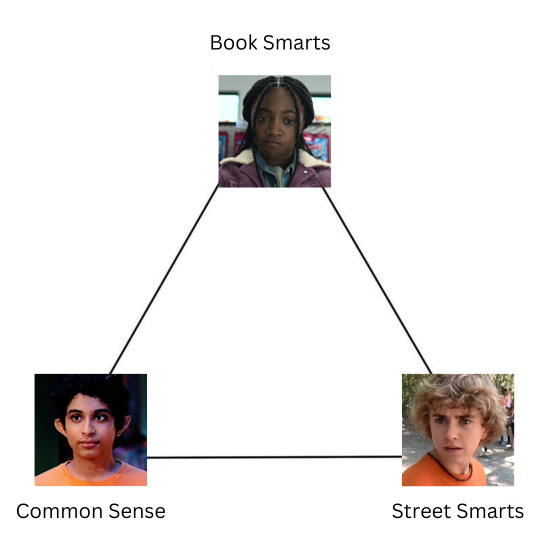
#it’s not that they don’t have the other two it’s that they all had their smarts privileges revoked#Annabeth lost her street smarts and common sense privileges when she tried to buy all that candy with only $200#Percy lost his common sense and book smarts privileges when he couldn’t figure out he was a son of Poseidon after using literal water powers#grover lost his book smarts and street smarts privileges after trying to reason with Medusa and a cop respectively#they’re all my children tho#don’t worry they’ll get their privileges back#eventually#percy jackson#pjo#percy jackon and the olympians#percy jackson and the olympians#pjo tv show#percy jackson tv show#pjo spoilers#percy jackson the lightning thief#pjo series#annabeth chase#grover underwood
16K notes
·
View notes
Text







Oh yeah his brain finally kick started processing his emotions! Against his will!!!
Bill at therapy part 1 | Part 2 | Part 3 | Part 4
#my art#bill cipher fanart#bill cipher#book of bill spoilers#book of bill#gravity falls#digital art#digital fanart#every good break up has tension filled dreams of your ex!#he’s a nerd too btw liking math and chess#fanart#Stanford pines#is this billford?#you can see how my energy was slowly dwindling away#i do these in one sitting btw#its late and im tired#my notes app is filled with bill comic ideas bruhv#anyways yay to processing your emotions?#guys im tired of ford being at bills mercy! time to give ford the power over bill!! give me more bill on his knees for sixer!!! ruaaa#static ford#bill in therapy
6K notes
·
View notes
Text
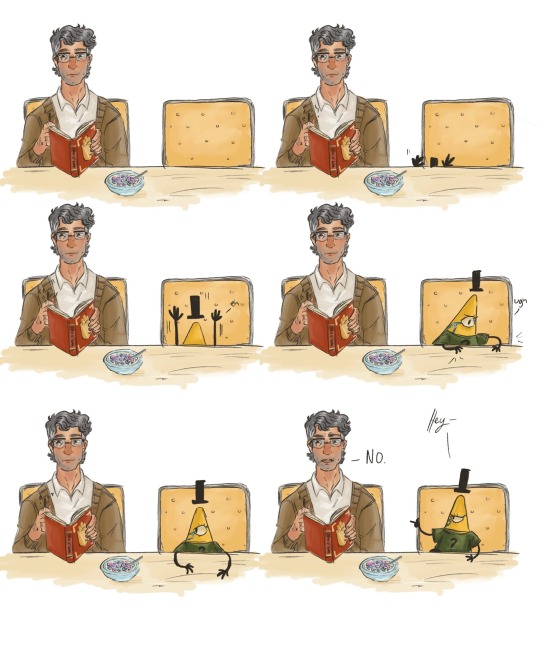
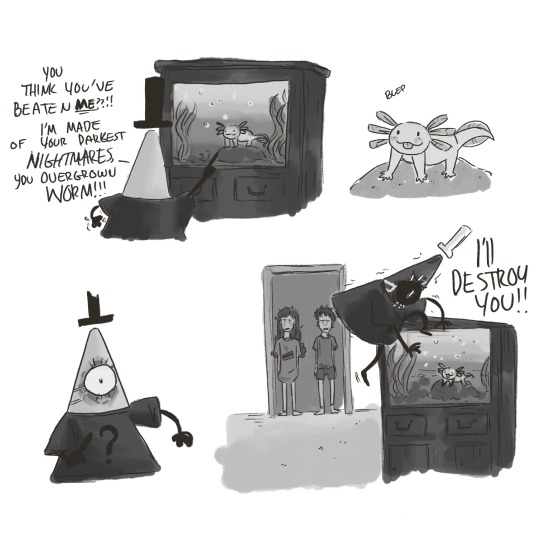
AU where the Axolotl sends Bill to the mystery shack for rehabilitation after spending some time in the Theraprism
(OG AU is by waty_mot on Twitter)
#gravity falls#bill cipher#Stanford pines#ford pines#Mabel pines#dipper pines#gravity falls axolotl#billford#book of bill#saw this on Twitter and immediately fell in love#I don’t post there though so it’s on here only😭#the axolotl took away his powers so he can’t float#he is very very tiny#fords just trying to ignore him#Mabel and dipper can’t#little me was too little to contribute to the fandom years ago so she’s happy she’s here now#frilliam#fords book is for chronically his and Stan’s adventures on sea#handyman bill au#I made this like the first day waty posted their au so I didn’t have an offical au tag name till now
4K notes
·
View notes
Text
25 Laws of power for women
Conceal your goals especially the ones that are appealing. Losing weight, reinventing yourself, marrying wealthy. Instead talk about your altruistic goals - to help children, invest in education, this will chase insecure people with vile intentions.
Do not give anyone your source of power: Was is a book that changed your life? a mentor? a movie? Never give up your secret to success. If forced to do say allude to God, the universe, the a random phenomenon
Use the patriarchy to your favor; we live in a world that is, only associate with men who have power, use that power for good.
Never appear too perfect but be selectively vulnerable when needed. Only share something that you will be comfortable saying. You might say “I forget my keys all the time,” “I don’t know how to perfectly park a car “. But never disclose something you are not comfortable with just because you are afraid of being perfect.
Maintain distance in relationships. Friends are the best and you need them. But if you feel that they are becoming too dependent, see them at your own will. But also the reverse could be the case. Your friend may keep a distance, and that is the way of life. You have got to move on from it.
Develop your own style that makes you unique, beautiful, and elegant. Avoid trying to fit in the crowd of people who claim to care less about their style yet have too many opinions about other women’s style
Avoid male friends at all cost, you will have male colleagues, male bosses, male acquaintances, business partners. Keep it that way. You do not want a Truman Capote divulging your secrets to the world. Do not keep a man who does not fit your standard.
You do not have to win at every game. Pick and choose what is best for you and leave room for others. And step down if you have attained that level of success, do not let the society do it for you.
Trust people but remember that we are all humans. So trust with discretion!
Confuse people with kindness; people are not always comfortable with beautiful and intelligent women. That power is too intimidating so confuse them by being genuinely generous, curious, kind, and passionate.
Keep your strong opinions to yourself.. if you support a movement, a way of life, do so silently.
We all have dirty laundry, wash them privately, don’t expose yourself. Remain silent when people try to attack you or shame you. Whatever is not confirmed is not true. You are the only one who knows all the truth about you.
Don’t attract pity or praise: People who pity you do not help you, in fact they might think that you are weak and could mock you at their annual gossipping meeting. And if you are doing things for the sake of praise you are wasting your time.
Choose yourself all the time; never put any one’s feelings above yours.
Trust your own intuition if you feel someone is being malicious towards you, giving you back handed compliments then you should let them go
Never speak bad of another woman. Do not lazy around gossipping. Keep your hands clean and your conscience clear.
Avoid women with low self esteem they will bring you down. For some reason they do not like seeing other women who are doing better than them
Be careful who you seek validation from. Not everyone needs to be pleased. If they are in no way capable of contributing to your life in the ways you prefer, then don’t ask them for their opinions or please them.
Do not compete with other women, if you do you are only putting them on a pedestal. You are making the the standard by which you measure your progress. If you do compete, begin digging your grave.
Do not give unsolicited advice, do not share the inner workings of your mind, If your mouth is very charitable you better start journaling.
Be well-rounded and interesting. It attracts people. It also keeps you busy because you are continually improving and learning. An idle mind is an easily subdued one.
Avoid women who want to live vicariously through you; they want to know who you know, shop where you shop, befriend who you befriend, wear what you wear.
Pay attention to the source of your discomfort; get rid of them. You tell them your dreams and they remind you of all your hindrances. They ask why are you dressed so fancy as though fancy isn’t subjective. They undermine you interests and goals. They will also be quick to bring you down because they are afraid of your potential.
Do not fear power or please power. When we see powerful people we try to hard to befriend them, to be close to them but you need to be comfortable without them. Don’t push yourself in the name of friendship, do not try too hard to be in their inner circle. Your independence of mind is the most important. Instead become a powerful woman, aloof to the presence of power but aware of its importance. Be an ingenious and intelligent and use your creativity to uplift yourself. When you do so it will be hard to ignore you. Even the powerful will become an ally.
Enjoy moments of solitude. Use that time to develop yourself, improve your body, learn new skills, create with your mind, read widely, become more elegant, then launch yourself.
Remember the most powerful women are the most intelligent. Inspired by Robert Greene's 48 Laws of Power. Use at your discretion.
#self improvement#self love#growth#mindfulness#self development#beauty#education#self care#classy#self help#power#new books#booklover#book review#book quotes#books#biography#self control#self discipline#self worth#students#smart#emotions#emotional intelligence#self growth#discipline#get motivated#life goals#gratitude#femininity journey
10K notes
·
View notes
Text
listen there really was just something about how in the book, snow’s 3-page descent from hesitant lover boy to deluded mfer happens entirely in his mind. lucy gray gives him no indication whatsoever that she suspects him, that she’s going to leave or betray him. he’s just sitting quietly in the cabin waiting for her to return when that seed of calculated suspicion, which he has needed to survive the capitol, takes a hold of him and chokes the life out of any goodness left inside him. it really drives home your terror as a reader that “oh my god did he kill her? did she escape? what happened to her? why would he even think that?” in a way that when the movie had to adjust for visualization it lost some of that holy shit this guy has lost it emphasis.
#seeing some discourse and im not saying lucy grey didnt know#im saying she never dropped the kind of hints that she knew like she did in the movie#or if she did snow isnt worried about them until he very suddenly is consumed by them#snow is not concerned about whether or not she believed him. of course she did! hes snow!#but then shes gone…. for a while……#and its the sudden immediate drastic unravelling that comes across so clearly in the book#that i knew wouldn’t translate to screen yet still cant help but miss#the hunger games#coriolanus snow#tbosas#lucy gray baird#not a crime or anything just a note that i cannot stop thinking about#the ballad of songbirds and snakes#this is all from memory of reading it quite a while ago. so maybe 3 pages is an exaggeration#but i remember it happening VERY quickly and without much external cause#like we as the reader have no indication as to whether shes nearby or not.#snow has no idea either. he just SUSPECTS. and his suspicion breeds the hatred that has been bubbling inside him all this time#he hates how she undoes him. he hates that he WOULD run away with her if shed let him keep his secrets#and he HATES more than anything that she makes him WANT to tell his secrets#he wants to be vulnerable and reveal the ugly nasty parts about himself and still be loved#but he does not let himself and it is everyone’s downfall#he chooses cruelty bc it is easy and familiar and makes him feel more powerful than the vulnerable give and take that real love requires
13K notes
·
View notes
Note
Perhaps Bill Cipher annoying Stanley or another member of the Pines family. (Or if you feel up to multiple, everyone e within the Pines family. Only if you want to though)
Have you ever seen that one handyman Bill au



#this au is so funny to me#very stylized T-rex skull there...#sorry these aren't properly colored. I finished them quickly because I knew I wouldn't feel up to make the colors again...#ask#anonymous#gravity falls#gravity falls au#handyman bill au#bill cipher#stanley pines#stan pines#stanford pines#ford pines#mabel pines#mason pines#dipper pines#billford#book of bill#the book of bill#art#fanart#traditional art#this au is basically 'bill gets sent to earth again after therapy because therapy wasn't working properly or something'#idk if he keeps his powers. I don't think he does. he's just a pathetic dorito now#I love limited color palettes
2K notes
·
View notes
Text
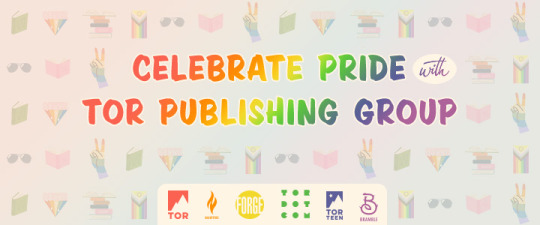
Celebrate Pride with Tor Publishing Group!

Rakesfall by @adamantine
They met as children in the middle of the Sri Lankan civil war. Later, in a demon-haunted wood, an act of violence linked them and propelled their souls on a journey through the ages. As they reincarnate ever deeper into the future, a truth emerges: Some stories take more than one lifetime to tell.
Running Close to the Wind by @ariaste
In this queer pirate fantasy, Avra Helvaçi has accidentally stolen the single most expensive secret in the world. To avoid capture, he flees to the open sea, where only his on-again, off-again ex aka pirate Captain Teveri az-Ḥaffār can help him survive, profit, and become a legend.
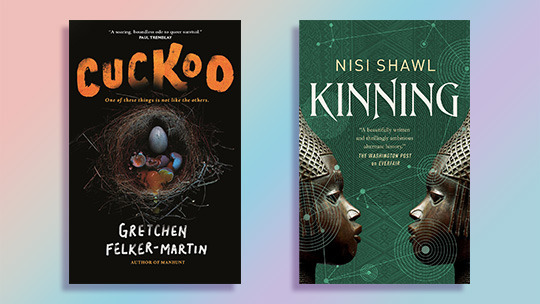
Cuckoo by Gretchen Felker-Martin
Something evil is buried deep in the desert. It wants your body and wears your skin. Welcome to Camp Resolution, a queer conversion center where everyone leaves a different person. In 1995, seven queer teens were abandoned here by their parents, but survived. Sixteen years later, they’re scarred and broken, but back to face an evil that threatens the world.
Kinning by Nisi Shawl
In this alternate history where barkcloth airships soar and former colonies claim freedom from imperialist tyrants, the identity of the island of Everfair still wavers. Victorious in the wake of the Great War, a new threat looms. Can Everfair continue to serve as a symbol of hope for anticolonial movements around the world, or will it fall to forces within and without?

Can’t Spell Treason Without Tea by @rebeccathornewrites
Can one of the Queen’s private guard and the most powerful mage in existence leave their lives behind to settle down in their new bookshop that serves tea? This cozy fantasy is steeped in sapphic romance and nestled on the edge of dragon country.
The Fragile Threads of Power by V. E. Schwab
Once there were four worlds, nestled like pages in a book, each pulsing with fantastical power and connected by a single city: London. After a desperate attempt to prevent corruption and ruin in the four Londons, there are only three. Now the worlds are going to collide anew—brought to a dangerous precipice by the discoveries of three remarkable magicians.
Now available in paperback!
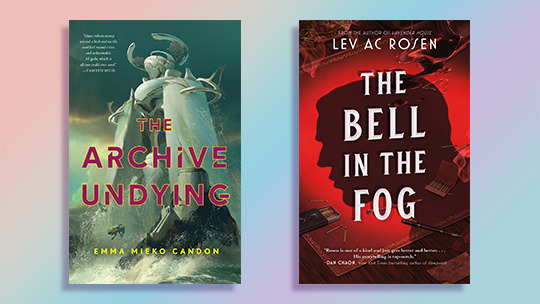
The Archive Undying by @emcandon
This is a story about misplaced faith, complicated love, so much self-loathing, and yeah—giant robots. Plugged into his AI god when its apocalyptic corruption renders him unfortunately immortal, sad gay disaster Sunai takes a die-again-or-die-trying approach to things. Unending life’s tough when intimacy is somehow scarier even than either of the warring police states set on turning you into a weapon or the rogue undead mecha-fragment of your old god that wants to eat you.
Now available in paperback!
The Bell in the Fog by Lev AC Rosen
A dazzling historical mystery that dives into the shadowy, closeted world of the Navy, emerging in the gay bars of the city. It’s a whirlpool of missing people, violent strangers, and scandalous photos in 1952 San Francisco.
Now available in paperback!
Celebrate Pride with more titles from Tor Publishing Group here!
#the archive undying#emma mieko candon#the bell in the fog#lev ac rosen#can't spell treason without tea#rebecca thorne#the fragile threads of power#v e schwab#cuckoo#gretchen felker-martin#kinning#nisi shawl#running close to the wind#alexandra rowland#rakesfall#vajra chandrasekera#tor books#tor publishing group#bramble romance#nightfire books#forge books#bramble#tordotcom publishing#tdcp#lgbtqia+#gay reads#tbr#new books
4K notes
·
View notes
Text


what one gay divorce and paying alimony does to a guy
#obsessed with the difference in how ppl en masse draw bill now vs pre book of bill#he went from powerful silly little guy to wet pathetic loser so fast#gravity falls#gravity falls fanart#bill cipher
1K notes
·
View notes
Text
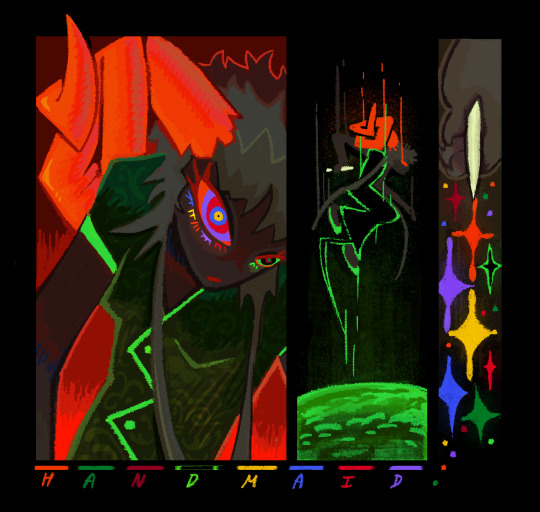
heiress eternal
#so many thoughts about her#the handmaid#the handmaid homestuck#homestuck ancestors#damara megido#homestuck#egg art#according to hussies book aradia was in contact with the handmaid to receive game instructions#which is interesting considering megidos can speak to the dead and the handmaid is one of the few ancestors alive#so either handmaid channeled a dead aradia or future aradia channeled a dead handmaid#handmaid could of also just manipulated the timeline to make sure aradia was the catalyst for the game being played#or something less more or equally complicated#and without this we just have to assume its maid powers allowing aradia to have flawless instruction of what to do or shes just a#level 3000 gigabrain girl genius at 13 years old#and instead of putting that interaction in the story we got. the dancestor flashes#so im a little miffed about it really
4K notes
·
View notes
Text
Do any of you ever wonder if Camp Half-Blood accidentally brought in a demigod of a different pantheon before?
This would be especially hilarious if it happens sometime after The Last Olympian/Heroes of Olympus, where the gods are required to claim their kids quickly.
A whole day passes, and the new demigod needs to sleep in the Hermes Cabin and Percy is furious. Meanwhile, the Greek Gods are pointing at each other and shouting, contacting the most obscure of mini gods. Chaos erupts on Olympus as every deity in Greek Mythology is called upon and interrogated. Hermes hasn't run around so much in centuries.
Hecate sits in silence, fully aware of what's happening, but enjoying the show too much to intervene.
#does anyone want a fanfic of this?#idk if the norse and greek gods are even aware of each other's existence#but it's funnier to imagine that they aren't really#hecate keeps them secret from each other to avoid zeus having a power struggle against odin#or something similar like that#this would be absolutely hilarious#especially if the kid turns out to be a child of a norse sea god#percy jackson#percy jackon and the olympians#magnus chase and the gods of asgard#magnus chase#norse gods#greek gods#pjo#pjo tv show#pjo series#pjo books#heroes of olympus#percy is threatening the gods aka it's wednesday#the poor lost demigod is confused
5K notes
·
View notes
Text


LADIES AND GENTLEMEN. IF YOU BELIEVE IT WILL HAPPEN. GOD BLESS BOOKPIN 🫡🫡
#IVE BEEN SHIPPING BOOKPIN#AND NOW I WIN#btw not 100% sold on pins bfdia design here for the wheels#i just did it cus i wanted to draw bookpin#bookpin#illustration#my art#art#fan art#my art!#my artwork#character design#bfdi#bfdi pin#bfdi book#bfdia#bfdia spoilers#bfdia 15#battle for dream island#bfdi humanized#bfdi fanart#object shows#tpot#the power of two#bfdi nickel
1K notes
·
View notes
Text


"One fell first the other fell harder" - denial edition
commission info here
Transcription of the chalkboard writing under cut
WEIRMAGEDDON PLAN
1) Get a naive idiot
2) He builds a portal
3) Develop feelings
3) Bring forth henchies
4) PARTY!!!
#billford#bill cipher#the book of bill#stanford pines#ford pines#my art#my fanart#it would not be so compeling if Stanford didn't have MULTIPLE oportunities to back tf down before it got bad AND DIDN'T TAKE EM#likewise#Bill had so many oportunities to either completely achive his goals by for example NOT GIVE FORD 3 DAYS TO MAKE A PLAN AND CALL FOR HELP#or#achieve self awereness / emotional vulnerability for once in his existence and make a genuine conection instead of chasing power#but alas#that makes it toxic yaoi babeeeey
2K notes
·
View notes